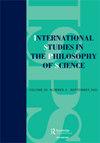威廉H.牛顿-史密斯(1943–2023)
IF 0.8
2区 哲学
Q2 HISTORY & PHILOSOPHY OF SCIENCE
International Studies in the Philosophy of Science
Pub Date : 2022-04-03
DOI:10.1080/02698595.2023.2208416
引用次数: 0
摘要
William(Bill)Newton Smith是一位著名的加拿大科学哲学家,他的职业生涯主要在牛津度过,然后在匈牙利的中欧大学度过。牛顿-史密斯出生于安大略省奥里利亚,在加拿大女王大学获得数学和哲学学士学位。在他读本科的第二年,他认定自己是一个逻辑实证主义者。在圣安德鲁斯大学交换奖学金的面试中,女王哲学系主任表示,他认为逻辑实证主义已经死了。牛顿-史密斯满怀信心地回答说,它可能不受欢迎,没有理由认为这不是真的!在圣安德鲁斯的一年里,他被后来的维特根斯坦迷住了。1966年从女王学院毕业后,他去康奈尔大学攻读博士学位,因为诺曼·马尔科姆有维特根斯坦所有未出版作品的复印件。纽顿·史密斯对马尔科姆没有什么印象,他转任分析哲学家马克斯·布莱克。他认为布莱克是一位伟大的导师,活泼而清晰,正是他自己将成为的那种老师和导师。但是NewtonSmith已经决定转学到牛津。布莱克不希望他在没有康奈尔大学学位的情况下离开伊萨卡,所以他为他在夏天获得了攻读硕士学位的资金。一到牛津,牛顿-史密斯就成了那里的领军人物。他在逻辑学家亚瑟·普赖尔的指导下完成了他的哲学研究。1970年,他当选为贝利奥尔学院院士。他是学院和大学的支柱,担任着学院和大学重要的行政职务。他是一位深受爱戴的本科生导师、讲师和导师,发表了数量惊人的博士论文。他能让逻辑变得有趣,对学生作业中的好(坏!)论点有敏锐的洞察力。牛顿-史密斯在哲学的几个领域做出了重要贡献,特别是在时间的本质和科学的一般哲学方面。也许他最重要的两部作品是《时间的结构》(1980年)和《科学的合理性》(1981年)。后者出现在现实主义辩论的中期,这在任何时候都是一个热门话题,尤其是在70年代末和80年代初。即使在四十年后,它仍然屹立不倒,为他现实主义的哲学方法提供了一个极好的快照。牛顿-史密斯是一位科学现实主义者;他对科学假设的理论实体毫不犹豫,尽管他确实对一个压迫现实主义者的问题有一个有趣的激进解决方案。他也是一个理性主义者;他相信科学已经有了明显的进步,哲学家的部分工作就是解释或理解这种进步。在牛顿-史密斯看来,传统理性主义者面临着许多挑战,包括:克服不可通约性问题(同一术语在不同的理论中可能有不同的含义);必须证明科学确实有目标;并解释科学的规范方法是如何实现这一目标的。最后,必须证明科学的规定哲学和科学的描述性历史之间有很好的契合,因为只有这样,我们才能对真正的科学变化做出令人满意的描述。本文章由计算机程序翻译,如有差异,请以英文原文为准。
William H. Newton-Smith (1943–2023)
William (Bill) Newton-Smith was a renowned Canadian philosopher of science who spent his career largely in Oxford and then at the Central European University in Hungary. Newton-Smith was born in Orillia, Ontario and completed a B.A. in mathematics and philosophy at Queen’s University, Canada. In his second year as an undergraduate, he decided he was a logical positivist. In the interview for an exchange scholarship with St Andrews, in which he would be successful and at which he would spend his third year, the head of the Queen’s philosophy Department remarked that he had thought logical positivism was dead. With the confidence of youth Newton-Smith replied that the fact that it may not be popular was no reason to think it wasn’t true! During his year at St Andrews he fell under the spell of the later Wittgenstein. Upon graduating from Queen’s in 1966, he went to Cornell to do a PhD, as Norman Malcolm had photocopies of all of Wittgenstein’s unpublished works. Unimpressed with Malcolm, NewtonSmith transferred to the analytic philosopher Max Black. He thought Black a great supervisor, lively and clear—just the sort of teacher and mentor he would himself become. But NewtonSmith had already decided to transfer to Oxford. Black didn’t want him leaving Ithaca without a Cornell degree, so he secured funding for him to do an MA over the summer. Once at Oxford, Newton-Smith became a leading figure there. He finished his DPhil under the supervision of the logician Arthur Prior. In 1970 he was elected a Fellow of Balliol College. He was a pillar of the College and the University, taking on important administrative positions for both. He was a beloved undergraduate tutor, lecturer, and supervisor of an astounding number of DPhil theses. He could make logic fun and had a fine nose for what was a good (and bad!) argument in a student’s work. Newton-Smith made important contributions in several areas of philosophy, especially the nature of time and the general philosophy of science. Perhaps his two most important works are The Structure of Time (1980) and The Rationality of Science (1981). The latter appeared in the middle of the realism debate, a hot topic at any time but particularly so in the late 70s and early 80s. Even after four decades it stands up well and gives an excellent snapshot of his realistic approach to philosophy. Newton-Smith was a scientific realist; he had no qualms about the theoretical entities postulated by science, though he did have an interestingly radical solution to one problem that presses in on the realist. He was also a rationalist; he believed that science has clearly progressed and part of the philosopher’s job is to explain or make sense of that progress. As Newton-Smith saw it, there are a number of challenges which face the traditional rationalist, including: overcoming the problem of incommensurability (the same term could have different meanings in different theories); it must be shown that science does indeed have a goal; and explaining how the normative methods of science lead to that goal. Finally, it must be shown there is a good fit between the prescriptive philosophy of science and the descriptive history of science, for only then can we give a satisfactory account of real scientific change.
求助全文
通过发布文献求助,成功后即可免费获取论文全文。
去求助
来源期刊

International Studies in the Philosophy of Science
HISTORY & PHILOSOPHY OF SCIENCE-
自引率
12.50%
发文量
10
期刊介绍:
International Studies in the Philosophy of Science is a scholarly journal dedicated to publishing original research in philosophy of science and in philosophically informed history and sociology of science. Its scope includes the foundations and methodology of the natural, social, and human sciences, philosophical implications of particular scientific theories, and broader philosophical reflection on science. The editors invite contributions not only from philosophers, historians, and sociologists of science, but also from researchers in the sciences. The journal publishes articles from a wide variety of countries and philosophical traditions.
 求助内容:
求助内容: 应助结果提醒方式:
应助结果提醒方式:


